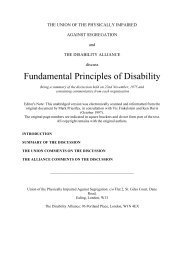Global-Report-Living-Colour-dr2-2
Global-Report-Living-Colour-dr2-2
Global-Report-Living-Colour-dr2-2
You also want an ePaper? Increase the reach of your titles
YUMPU automatically turns print PDFs into web optimized ePapers that Google loves.
Inclusive Communities = Stronger Communities<br />
GLOBAL REPORT ON ARTICLE 19: THE RIGHT TO LIVE AND BE INCLUDED IN THE COMMUNITY<br />
63<br />
decisions with the help of the people who they are<br />
closest to and who they trust, like family, friends and<br />
colleagues. For people who require support to make<br />
decisions, supported-decision making is a process<br />
that grows and changes as the person does.<br />
Supported decision-making can take many forms<br />
and encompasses a range of supports. It could<br />
include minimum levels of support such as<br />
assistance in understanding a decision. This could<br />
require the provision of plain language and/or<br />
support to understand a decision or more intensive<br />
levels of support like a support circle or network that<br />
articulates an individual’s decision through<br />
knowledge about the individual’s will or<br />
preference. Even for those who can<br />
articulate with words their vision for<br />
living and being included in the<br />
community or other decisions in<br />
traditional ways, the right to support in<br />
decision making is critical to inclusion.<br />
Supported decision-making is a way for<br />
ensuring that all people – regardless of<br />
how others perceive their capacity to<br />
make decisions – are able to have<br />
control in their own life.<br />
‰ Denial of the Right to Enter into Contracts<br />
Not only do people with intellectual disabilities need<br />
to be able to decide where and with whom they live,<br />
living in the community requires being able to enter<br />
contracts. We heard from families and self-advocates<br />
about people being denied the right to enter rental<br />
agreements, utilities contracts, employment<br />
contracts, marriage, etc. whether because of a<br />
guardianship order or because of the perception by<br />
third parties of their “incapacity”. Third parties<br />
including medical professionals, service providers,<br />
financial institutions, lawyers, etc, who have liability



